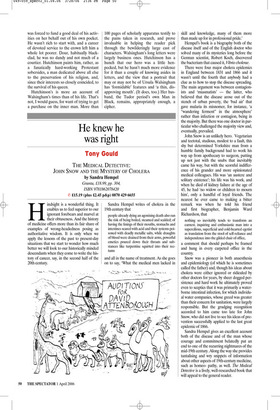He knew he was right
Tony Gould
THE MEDICAL DETECTIVE: JOHN SNOW AND THE MYSTERY OF CHOLERA by Sandra Hempel Granta, £18.99, pp. 304, ISBN 9781862078420 ✆ £15.19 (plus £2.45 p&p) 0870 429 6655 Hindsight is a wonderful thing. It enables us to feel superior to our ignorant forebears and marvel at their obtuseness. And the history of medicine offers more than its fair share of examples of wrong-headedness posing as authoritative wisdom. It is only when we apply the lessons of the past to present-day situations that we start to wonder how much better we will look to our historically minded descendants when they come to write the history of cancer, say, in the second half of the 20th century. Sandra Hempel writes of cholera in the 19th century that
people already dying an agonising death also ran the risk of being boiled, steamed and scalded; of having the linings of their mouths, stomachs and intestines seared with acid and their systems poisoned with deadly metallic salts, while draughts of blood were drained from their arms, powerful emetics poured down their throats and substances like turpentine squirted into their rectums
and all in the name of treatment. As she goes on to say, ‘What the medical men lacked in skill and knowledge, many of them more than made up for in professional pride.’ Hempel’s book is a biography both of the disease itself and of the English doctor who solved many of its mysteries long before the German scientist, Robert Koch, discovered the bacterium that caused it, Yibrio cholerae.
There were four major cholera epidemics in England between 1831 and 1866 and it wasn’t until the fourth that anybody had a clue as to how to stop the disease spreading. The main argument was between contagionists and ‘miasmatists’ — the latter, who believed that the disease arose out of the stench of urban poverty, the ‘bad air’ that gave malaria its misnomer, for instance, ‘a “wandering ferment” in the atmosphere’ rather than infection or contagion, being in the majority. But there was one doctor in particular who challenged the majority view and, eventually, prevailed.
John Snow is an unlikely hero. Vegetarian and teetotal, studious, modest to a fault, this shy but determined Yorkshire man from a humble family background had to work his way up from apothecary to surgeon, putting up not just with the snubs that inevitably came his way, but with the scornful indifference of his grander and more opinionated medical colleagues. His was ‘an austere and solitary existence’; his life was his work, and when he died of kidney failure at the age of 45, he had ‘no widow or children to mourn him’, only a handful of loyal friends. The nearest he ever came to making a bitter remark was when he told his friend and first biographer, Benjamin Ward Richardson, that
nothing so inevitably tends to transform an earnest, inquiring and enthusiastic man into a supercilious, superficial and cold-hearted egotist as translation from the stool of self-reliance and independence into the gilded chair of office,
a comment that should perhaps be framed and hung in every carpeted office in the country.
Snow was a pioneer in both anaesthesia and epidemiology (of which he is sometimes called the father) and, though his ideas about cholera were either ignored or ridiculed by other doctors for years, by sheer dogged persistence and hard work he ultimately proved even to sceptics that it was primarily a waterborne intestinal infection, for which individual water companies, whose greed was greater than their concern for sanitation, were largely responsible. But the grudging recognition accorded to him came too late for John Snow, who did not live to see his ideas of prevention successfully applied to the last great epidemic of 1866.
Sandra Hempel gives an excellent account both of the disease and of the man whose courage and commitment belatedly put an end to one of the recurring nightmares of the mid-19th century. Along the way she provides tantalising and wry snippets of information about other aspects of 19th-century medicine, such as homeopathy, as well. The Medical Detective is a lively, well-researched book that will appeal to the general reader.


























































































 Previous page
Previous page